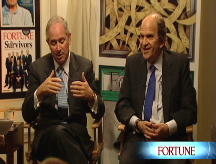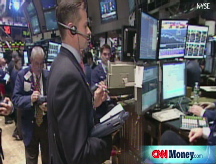Strong end to a brutal month
Investors muster gains at the end of one of the worst months in Wall Street history. Good news: Stocks rally this week.

 |
| The Dow lost 1,526 points in October - the worst monthly point loss ever. |
NEW YORK (CNNMoney.com) -- Stocks rallied Friday, capping off a strong week at the end of one of the worst months in Wall Street history.
The Dow Jones Industrial average (INDU) gained 144 points or 1.6%. The Dow also gained Thursday, making this the first time in October the blue-chip indicator has gained two sessions in a row.
The Standard & Poor's 500 (SPX) index gained 1.5% and the Nasdaq composite (COMP) added 1.3%.
Stocks have rallied sharply this week, with investors stepping back in to select areas of the market, at the end of a nearly two-month bloodletting that hit its stride in October. (For details, click here).
For the week, the Dow was up 10.1%, the S&P 500 was up 9.5% and the Nasdaq had gained 9.8%.
The gains this week reflect all the selling in the previous weeks - and that investors have already priced in a pretty severe economic downturn, said Rob Lutts, chief investment officer at Cabot Money Management.
On a short-term basis, these factors are giving stocks a lift. He said that next Tuesday's presidential election has also played a role in the rally this week.
"No matter what happens, we are going to have a new administration and that's going to give us a bounce," Lutts said.
Beyond that, the focus returns to the recession, he said, and stocks probably have another leg down amid questions about the depth and length of the slowdown.
"This is a dangerous market and obviously people have lost a lot of money this year," Lutts said. "But I'm not sure the market has fully discounted the slowdown yet."
Despite the gains this week, investors pulled more money out of equity mutual funds than they did in the previous week, according to fund tracker Trim Tabs. Withdrawals from stock mutual funds in the week ended Oct. 29 rose to 9.2 billion from 6.5 billion the previous week.
Investors have gone from fear to panic to the current cautious mode, said Joe Arnold, wealth manager at Dawson Wealth Management.
"I think people are feeling a little numb right now," he said. "They're ready for the economy to turn around, and they know it will eventually, but we still have a ways to go before that happens."
A variety of economic reports were released Friday, including readings on personal income and spending, regional manufacturing and consumer sentiment.
Results: Chevron (CVX, Fortune 500) reported sharply higher sales and earnings in the third quarter that topped estimates, thanks to the surge in oil prices through the first part of the quarter. On Thursday, Exxon Mobil reported the biggest quarterly profit ever and other oil services firms have also reported big profits.
But the energy sector was an exception.
With roughly 65% of the S&P 500 results out, profits are currently on track to have fallen 11.7% versus a year ago, according to the latest data from tracking firm Thomson Reuters.
Insurers continued to tumble, with Cigna (CI, Fortune 500) losing another 10% in active New York Stock Exchange trading after reporting a big drop in third-quarter profit and said that 2008 profit won't meet earlier forecasts.
Video game publisher Electronic Arts (ERTS) posted a wider quarterly net loss Thursday night and said it is cutting 6% of its workforce to trim costs. Shares fell 17.9% Friday.
Among other movers, General Motors (GM, Fortune 500) continued to retreat on general worries about the automaker sector and on speculation that a potential deal with Chrysler won't come through due to lack of financing. GM lost 4.6% Friday. It's down nearly 40% in October and almost 80% this year.
Financial stocks led the advance, with American Express (AXP, Fortune 500), Citigroup (C, Fortune 500), JPMorgan Chase (JPM, Fortune 500), Wells Fargo (WFC, Fortune 500) and Morgan Stanley (MS, Fortune 500) all gaining.
Market breadth was positive. On the New York Stock Exchange, winners beat losers eleven to four on volume of 1.57 billion shares. On the Nasdaq, advancers topped decliners three to one on volume of 2.50 billion shares.
Economic news: Personal income rose 0.2% in September, edging forecasts for a rise of 0.1% following the previous month's rise of 0.5%. But that didn't correspond to increased spending, which fell 0.3% in the month versus a flat reading in the previous month and forecasts for a dip of 0.2%.
The Chicago PMI, a regional read on manufacturing, plunged deeper into recessionary territory, in tune with other regional manufacturing readings. PMI fell to 37.8 in October from 56.7 in the previous month. Economists thought it would fall to 48.
Consumer sentiment fell to 57.6 in October from 70.3 in September, according to a University of Michigan report Friday. It was the biggest month-to-month drop ever.
The employment cost index, a measure of total compensation costs, rose 0.7% in the third quarter, in line with forecasts and following a rise of 0.7% in the previous quarter.
Other markets: The dollar gained against the euro and fell against the yen.
COMEX gold for December delivery fell $20.30 to settle at $718.20.
U.S. light crude oil for December delivery rose $1.85 to $67.81 a barrel on the New York Mercantile Exchange.
Gasoline prices fell another 4.3 cents overnight, to a national average of $2.504 a gallon, according to a survey of credit-card activity by motorist group AAA. It was the 44th consecutive day that prices have decreased. During that time, prices have fallen by $1.35 a gallon, or 35%.
Lending rates: The credit market continued to improve, with Libor, the overnight bank-to-bank lending rate, falling to 0.41% from 0.73% Thursday, according to Dow Jones. The 3-month Libor fell to 3.03% from 3.19% Thursday. (Full story)
The yield on the 3-month Treasury bill, seen as the safest place to put money in the short term, rose to 0.44% from 0.4% late Thursday, with investors preferring to take a small return on their money than risk the stock market.
Last month, the 3-month yield reached a 68-year low around 0% as investor panic hit its highest level.
Treasury prices inched higher, giving up bigger gains. The advance lowered the yield on the benchmark 10-year note to 3.96% from 3.97% Thursday. Treasury prices and yields move in opposite directions.
A brutal month: Stocks have bounced back this week, finding some momentum at the end of a wretched October.
Yet, despite the recovery, October still goes down in the history books as one of Wall Street's worst months of all time.
In the month, the Dow lost nearly 1,526 points, the Dow's worst month ever, according to Stock Trader's Almanac info going back to 1901. On a percentage basis, the decline of 14.1% doesn't rank in the top ten.
The S&P 500 lost nearly 198 points, or 16.9% in the month, and is currently on track to post its worst month ever on a point basis and eighth worst ever on a percentage basis, going back to 1930.
The Nasdaq dropped 361 points, or 17.4% in October, tracking its seventh-worst month ever on a point basis and its fifth-worst month on a percentage basis, going back to its inception in 1971. ![]()
Greed is no longer good on Wall Street
Four ways to buy and hold
Hoping the worst is over for insurers
The week that crushed Wall Street
Election 2008: The Candidates and your money
Ultimate retiring guide: 383 questions answered
Issue #1: America's Money
50 years of profit swings




